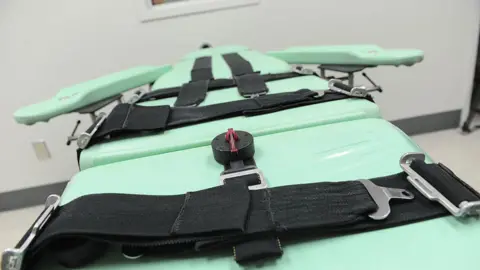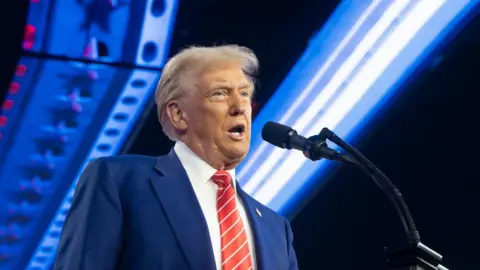 Getty Images
Getty ImagesWith just weeks left in office, US President Joe Biden commuted the sentences of 37 of 40 federal death row inmates – potentially thwarting President-elect Donald Trump's plans to expand federal executions during his incoming administration.
Biden's move was quickly condemned by Republicans, with some accusing the president of siding with criminals over law-abiding Americans.
Federal executions were relatively rare before Trump's first term, which ended with a wave of executions that ended a 130-year precedent of executions being suspended amid presidential transitions.
He has vowed to resume the practice when he returns to the White House in January, setting the stage for possible legal battles early in the administration.
Here's what we know.
Biden's decision was criticized
on Monday, Biden commuted the sentences of 37 of 40 death row inmatescommuting their sentence to life without parole.
Only three inmates were left on death row, including convicted Boston Marathon bomber Dzhokhar Tsarnaev and Robert Bowers, who was sentenced to death for killing 11 worshipers and injuring seven during a shooting at the Tree of Life Synagogue in Pittsburgh in 2018
The third, Dylann Roof, was sentenced to death in 2017. for a mass shooting that left nine black parishioners dead at Mother Emanuel AME Church in Charleston, South Carolina, in 2015.
While the move was widely praised by rights groups such as Amnesty International, it was quickly condemned by some Republicans as well as Trump's transition team and political allies.
In a statement, Trump's communications director Stephen Cheung said “they are among the worst killers in the world and this disgusting decision by Joe Biden is a slap in the face to the victims, their families and their loved ones.
“President Trump supports the rule of law, which will return when he returns to the White House,” he added. Trump cannot reverse the changes when he returns to the White House next month.
Texas Republican Chip Roy posted on X that the decision was “unconscionable” and an abuse of power “to commit a miscarriage of justice.”
Another Republican, Arkansas Sen. Tom Cotton, said that “when given a choice between law-abiding Americans or criminals, Joe Biden and the Democrats choose criminals every time.”
Some family members also expressed anger.
On Facebook Heather Turner – whose mother was killed in a bank robbery in 2017. – called the changes a “gross abuse of power”.
“At no point did the president think about the victims,” she wrote. “His hands and his supporters are bloody.
The commutation does not apply to the approximately 2,200 death row inmates sentenced by state courts over which the president has no authority.
 Getty Images
Getty ImagesWhat did Trump say about the death penalty?
During his campaign, Trump promised to resume federal executions and make more people eligible for the death penalty, including those convicted of child rape or drug and human trafficking cases, as well as migrants who kill Americans citizens or police officers.
“These are terrible, terrible, terrible people who are responsible for death, carnage and crime across the country,” Trump said when he announced his 2022 presidential bid.
“We will demand that anyone selling drugs be caught, get the death penalty for their heinous acts,” he added.
There are more than 40 federal laws that could, in theory, lead to the death penalty, ranging from murders committed during drug-related shootings to genocide.
Almost all – with the exception of espionage and treason – explicitly involve the death of a victim.
However, Trump has provided few details on how he plans to fulfill his campaign promise.
Despite the lack of clarity, Trump's promises to expand the federal death penalty have drawn strong warnings from human rights advocates.
In a Dec. 11 statement, for example, the American Civil Liberties Union said Trump's “chilling” plans amounted to an extension of the “killing spree he began in the last six months of his first presidency.”
“He has already shown us that he will deliver on those promises,” the statement said.
Inmates executed in the final days of Trump's first administration include Lisa Montgomery, the first woman executed by the federal government since 1953. here, and Lesmond Mitchell, the only Native American sentenced to death in a federal state.
What can Trump actually do?
American media reported that Trump could not reverse Biden's changes.
Trump's efforts to expand the death penalty for crimes that do not involve murder are likely to face legal challenges.
In 2008 for example, the Supreme Court ruled that those convicted of raping children could not be executed, adding that it was unclear whether the death penalty could be applied to crimes where the victim was not killed.
According to the National Registry of Exonerations, cases involving child victims are particularly prone to wrongful convictions, can be “extremely emotional” and can pit family members against each other.
Any further expansion of the crimes that qualify for the federal death penalty would require Congress to act and change the law.
In 2024 two bills — both sponsored by Florida Republican and Trump ally Anna Paulina Luna — seek to expand the use of felonies to include possession of child pornography, as well as the trafficking, exploitation and abuse of children.
Both failed to pass the House of Representatives.
Trump is also unlikely to be able to quickly rebuild the pool of federal death row inmates, as most death row cases take years and are subject to lengthy appeals processes.
Although he has no direct authority over state executions, some experts have warned that Trump's stance on the death penalty could prompt more executions at the state level.
“His rhetoric can and has encouraged draconian measures and attitudes by state leaders on several issues, including in the context of the criminal justice system,” Yasmin Kader, deputy legal director at the American Civil Liberties Union and director of the Trone Center for Justice and Equality CNN said.
In addition to the federal government and the US military, 27 US states still have the death penalty on the books.
A Gallup poll conducted in October found that a slim majority of Americans — 53 percent — support the death penalty for convicted murderers, up from 50 percent a year earlier.

